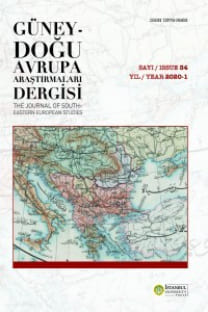AN ANALYSIS OF THE PUBLIC DIPLOMACY OF THE EUROPEAN UNION AND RUSSIA ON EURASIAN PROJECT JUST AFTER THE COLD WAR
European Union, Russia, Commonwealth Of Independent States, Eurasia, Energy, Public Diplomacy, Soft Power
___
- Aslanhan, Berk, "Rusya' nın Yeni Kuzey Kafkasya Projesi ", Politika ve Kültür Araştırmaları Grubu, http://www.politikkultur.org/?&Bid=336618 Blank, Stephen, "Energy, Economics and Security in Central Asia", CentroI Asian Survey, vol: 14, no:3 ,1995. Cohen, Ariel , "Yeni Büyük Oyun Avrasya'da Boru Hattı Siyaseti", Avrasya Etüdleri, cilt:1, İlkbahar 1996. Cohen, Ariel, Russian Imperialism: Development and Decline, (New York: Praeger Publications, 1996). Croissant, Michael, "Transkatkasya'da Petrol ve Rus Emperyalismi", Avrasya Etüdleri, cilt:1 , İlkbahar, 1996. Caşın,Mesut Hakkı, Novgorod Knezliği'nden XXI. Yüzyıla RUS İMPARATORLUK STRATEJİSİ, (İstanbul: Okumuş Adam Yayınları, Nisan 2006). Dawisha, Karen, "Russian Foreign Policy in the Near Abroad and Beyond'', Current History , vol:95, no:603, October 1992. Delegation of the European Commission to the United States's of Amerika website: http://www.eurunion.org/eu/ Dugin, Aleksandr, Rus Jeopolitiği Avrasyacı Yaklaşım, Vügar İmanov( çev.), (İstanbul: Küre Yayınları, Temmuz 2003). Elst, M. "The Protection of National Minorities in the Council of Europe and the Commonwealth of lndependent States. A Comparison in Standard Setting " in: K. Malfliet and R. Laenen (eds), Minority Policy in Central and Eastern Europe- The Link between Domestic Policy, Foreign Policy and European Integration, (Leuven: Institute for European Policy, 1998). Fiona Hill, "The Caucasus and Central Asia: How the United States and Its Allies Can Stave off a Crisis", http://www.brookings.edu/papers/2001/05asia_hill.aspx Gasimov, Musa, "Rusya'nın Azerbaycan Politikası" Avrasya Dosyası , cilt:7, sayı:4, Kış 2001-2002. Gertz, Bill , "Russian Agents Teach Iranian Spies",The Washington Times, November 9, 1995. Hatipoğlu, Esra, "Avrupa Birliği- Orta Asya İlişkilerinde Yeni Bir Stratejiye Doğru (mu?), Journal of Central Asian and Caucasian Studies vol:3 no:5, 2008, Uluslararası Stratejik Araştırmalar Kurumu USAK http://www.usak.org.tr/dosyalar/dergi/mtpdluxCpQkZmeLfeVlDVtClntLFoP.pdf Ian Breenmer and Antony Ricters, "The Perils of Sustainable Empire ", Transition, March 15, 1994. Igor Gali, V.l. Groov- G.A. Vasilyev, O.S.Senin, Sovyetler Birliği Neden/ Nasıl Yıkıldı, Arif Berberoğlu( derleyen ve Rusçadan çeviren), (Ankara: Phoenix Yayınları, Eylül 2008). Jopp, Mathias and Barbara Lippert, Towards a Solution of the Baltic Issue: the EU's Role", in: States Mathias Jopp& Sven Arnswald (eds), The European Union and the Baltic States Visions, Interests and Strategies for the Baltic Sea Region, Program on the Northern Dimension of the CFSP, vol:2, (Helsinki&Bonn: Ulkopoliittinen Instituutti& Institut für Europaische Politik, 1998). Kasım, Kamer, Soğuk Savaş Sonrası Kafkasya, (İstanbul: USAK Yayınları, 2009). " Kafkas Cephesi 'nde Yeni Bir Şey Yok!", Diplomatik Gözlem, Http://www.diplomatikgozlem.com/haber_oku.asp?id=3857 Kuloğlu ,Armağan, "Rusya Federasyonunun Yeni Kaftkasya Politikasi", Stratejik Analiz, cilt:1, sayı:3 Mayıs 2000 . Malfliet, Katlijn,"The Commonwealth of Independent States: Russian Ambitions Disguised in a European (Eurasian) Project?", in: Tom Casier & Katlijn Malfliet (eds), Is Russia A European Power? The Position Of Russia in a New Europe, ( Belgium : Leuven University Press, 1998). Mendras , Maria, "Reflections on the CIS: Myhts and Realities of a Five Year-Old Community", European Construction and CIS Integration, Report of the Seminar at the Robert Schuman Center in Florence, 15-16 May 1997. Nausabayeva, Asem , "Yeltsin'den Sonra Putin'le Yeni Rusya", Stratejik Analiz, cilt:1 , sayı:1, Mayıs 2000. Laçiner, Sedat, "Hazar Enerji Kaynakları ve Enerji -Siyaset ilişkisi", Journal of Central Asian and Caucasian Studies vol:1 no:1, 2006,Uluslararası Stratejik Araştırmalar Kurumu USAK http://www.usak.org.tr/dosyalar/dergi/vRPhzlqgAaUzEbsqIgyiYdXFvT60sp.pdf Ogan, Sinan ,"Sovyetler Birliği'nin Mirası Dağılıyor...", Uluslararası İlişkiler ve Stratejik Araştırmalar Merkezi TURKSAM, http://www.turksam.org/tr/a697.html Onay, Yaşar, Rus Stratejisinin Mimarları, (İstanbul : İlgi Kültür Sanat Yayıncılık, Ocak 2008). Olcott, B.Martha, "Russia's Place in the CIS", Current History, vol:92, no:576, 0ctober, 1993. Pechota, V. "The Commonwealth of Independent States: A Legal Profile", Parker Scholl Journal of East European Law, vol:2, no:4-5, 1995. Purtaş, Fırat, Rusya Federasyonu Ekseninde Bağımsız Devletler Topluluğu, Ankara: Platin Yayınları, 2005 . Primakov, Yevgeniy, " Kapalı Kutu" Rusya Üst Düzey Siyaset Koridorlarında Bir Yaşam, Nuri Eyüpoğlu (çev) Ayşe Edirne (der), Ring Reklamcılık A.Ş., Ekim 2002. Shashenkov, Maxim, "Russian Peacekeeping in the Near Abroad", Survival, vol :36, no:3, Autumn 1994. Şen, Gürkan , "Şanghay Beşlisi ", Stratejik Analiz, cilt:1, sayı: 1 , Mayıs 2000 . Ulusoy, Belkıs & Okan Yeşilot, "Avrasya Coğrafyasında Rusya-ABD Nüfuz Mücadelesi", Turuncu Devrimler SOROS 'un Yeni Dünya Düzeni: İkinci El Demokrasi ve Neconlar, Sinan Ogan(der), (İstanbul : Birharf Yayınları, 2006). Voskressenski , Alfred , Russia, China, USA, Redefining the Triangle, ( New York: Nova Science Publishers, 1996). Yalçınkaya, Alaeddin, Türk Cumhuriyetleri ve Petrol Boru Hatları, (İstanbul: Bağlam Yayınları, 1998). Yeşilot, Okan, Ateş Çemberinde Azerbaycan, (İstanbul: Yeditepe Yayınları, 2010).
- ISSN: 0378-3863
- Başlangıç: 1974
- Yayıncı: İstanbul Üniversitesi
İSTANBUL ERMENİLERİNİN DİNİ, TOPLUMSAL VE KURUMSAL PROBLEMLERİ: MEZARLIKLAR SORUNU (19. YY)
SERBEST CUMHURİYET FIRKASl'NIN YABANCI KAMUOYUNDA DEGERLENDİRİLİŞİ
İKİNCİ DÜNYA SAVAŞI SONRASINDA TÜRK AMERİKAN İLİŞKİLERİ
BOSNA-HERSEK TRAJEDİSİNDE (1992-1995) TÜRK BİRLİĞİ
1930 YILI TÜRK-YUNAN DOSTLUK ÇABALARI
